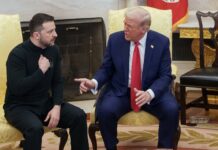Politics is an ugly game anywhere in the world. Politicians are known for lying, cutting corners, stealing, etc., anything to get into positions of power. Virtue is not a value we often assign towards politicians. In fact, there are many who may even regard the term “good politician” as an oxymoron.
Nowhere is this reality more apparent than in African countries. African politicians are generally regarded as being corrupt or even incompetent, both at home and abroad.
African countries could be among the most developed and prosperous nations in the world. Our continent has been blessed with unimaginable wealth, due to the abundance of natural resources in most of our countries. However, much of that wealth has been syphoned off by corrupt politicians and government officials.
So much so, the question has been raised whether Africa’s natural resources have been a blessing or a curse. Rather than bring prosperity, corrupt individuals have managed to exploit the resources for their own benefit, at the expense of the general population. Likewise, this wealth has been used to prop up authoritarian regimes, who use their country’s wealth to fund their regimes.
Where are the good politicians?
To say that Africa has not had any good politicians wouldn’t necessarily be true. There have certainly been many good politicians who have been in power in some countries at one point or the other.
When looking back at many of our countries’ struggles for independence, many virtuous leaders had risen into positions of power. Leaders like Nelson Mandela in South Africa, Sam Nujoma from Namibia, are leaders that are generally held in high regard for their work in their nations.
However, due to the political environment in many of our countries, these sorts of good politicians have been few and far between.
“Politics is too ugly”
A major problem for most people, who may feel as if they have ideas or policies that they could implement to improve the lives of many, is the political environment.
For many decent people, they may look at the corruption and abuse of power that takes place in many governments and simply become turned off by it. They may feel that because their values go against dealing in such a shady manner, they will be less likely to garner any success from taking part in politics.
The problem with this approach is that it then becomes a self-perpetuating cycle. Because good people are turned off by the corruption in politics and generally avoid it, only people who don’t mind taking part in shady dealings are the only ones willing to run for office.
Barriers to entry
Another major reason why there aren’t enough “good politicians” in positions of people is due to the barriers out in place preventing them from being able to run for office, such as:
- High electoral candidate fees
It is not uncommon for governments to put in place unreasonable large hurdles for their opponents, through their country’s electoral systems.
Things like incredibly high fees that electoral candidates have to pay in order for them to appear on ballots, is a tactic often employed by many governments to stifle their opposition.
- Unreasonably complex electoral procedures
Another tactic often employed by ruling governments in order to stifle opposition is by putting in place unreasonably restrictive electoral rules and procedures. The nature of these regulations make it easy for electoral commissions to disqualify opposition candidates who may pose a threat to the ruling party’s power on technicalities.
- Threats and intimidation
In African countries with less adherence to democratic principles, opposition candidates are regularly subjected to threats and intimidation from ruling parties. These threats towards opposition candidates are aimed at preventing any scenario where the ruling party’s power is weakened.
Lack of Youth Representation
Another major reason for the lack of “good politicians” is due to the lack of youth representation in many African governments. Younger people often hold greater ideals, which in turn make them more likely to perform well in positions of political influence.
However, when we look at Africa’s political class, it is often filled with much older generations. Despite Africa being the continent with the youngest generation in the world, politicians are typically much older than the median age of our countries.
This in part stems from a general lack of interest in politics by younger generations.
However, a major reason for this lack of youth participation stems from many of the barriers placed by governments that prevent younger Africans from being more politically engaged.











